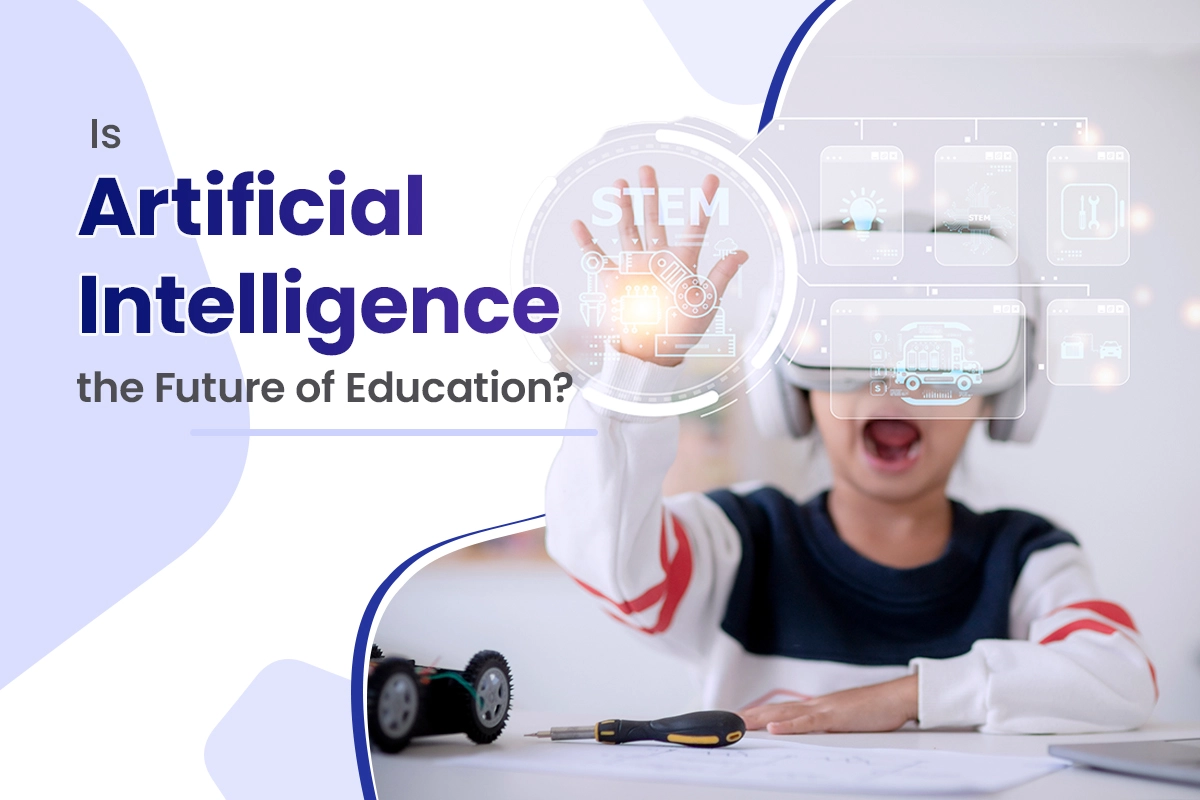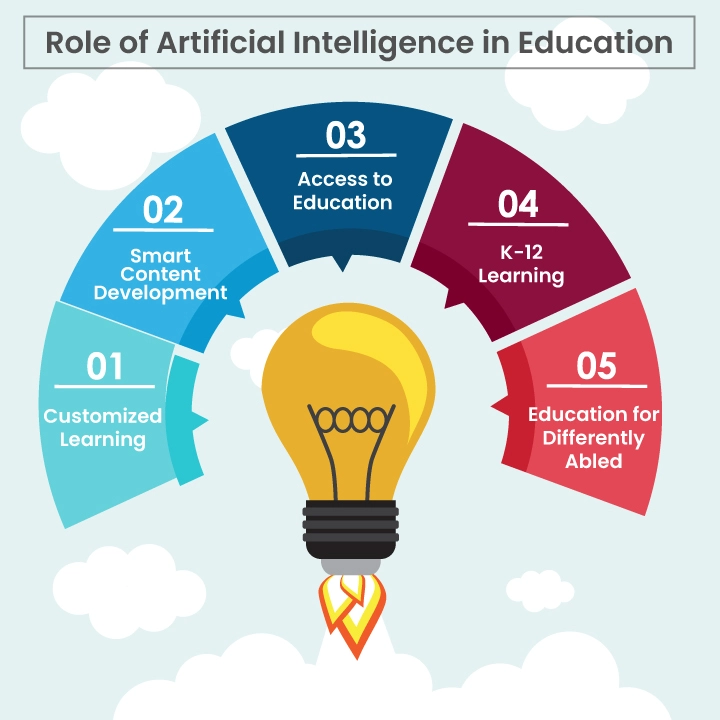
Artificial intelligence in education is essential for innovation and growth in all sectors. While AI-powered technologies have existed everywhere in the Education sector, and have been sluggish in their acceptance.
The term 'artificial intelligence (AI)' was coined in 1956 when John McCarthy and Marvin Minsky hosted the Dartmouth Summer Research Project over Artificial Intelligence (COMEST, 2019; Haenlein & Kaplan, 2019)
According to a PwC study, AI has a potential contribution of $15.7 trillion to the global economy by 2030,
This potential can be unlocked if EdTech companies adopt AI-powered technologies, promoting the sector to maximize its economic gains in the future.
Artificial intelligence is a modern computer science field that commands machines to stimulate human intelligence processes. Its primary goal is to streamline routine processes and increase their effectiveness and speed. It has led to an upsurge in businesses using AI globally.
Artificial intelligence in the education sector can improve learning and teaching methods. Assisting the education industry and simultaneously developing to benefit students and teachers. Here is how AI can benefit both students and educators:
AI can help students quickly sort through large volumes of data to uncover relevant information, detect patterns, and generate meaningful insights that can be applied to their projects. That's not it; students can have a modernized approach to learning with AI-based Virtual reality simulations.
These interactive and fun learning experiences can provide students with an authentic and collaborative way to learn, offering real-life scenarios without the associated risks. AI-generated virtual reality simulations can also be customized for different purposes and objectives while allowing learners to interact with their environment at their own pace.
For example, AI-generated simulations can train medical students to handle high-pressure scenarios, such as a patient suffering from cardiac arrest, without real-world risks. These simulations can be designed to mimic real-world scenarios as closely as possible, providing a safe environment for medical students to learn and practice their skills. AI technology can also analyze data from medical records to identify trends and predict future outcomes, helping improve patient care.
More specifically, students attend an educational institution only to receive a certificate or other document attesting to their knowledge.
AI can significantly impact students' educational journeys by increasing access to relevant courses, improving interaction with instructors, and assigning more time to concentrate on other aspects of their lives.
AI-powered technology can help educators, from grading assessments to delivering personalized guidance to students.
Artificial Intelligence can also automate boring tasks such as grading assignments, allowing teachers to focus more on providing personalized feedback. Further, AI can be used to create personalized learning plans tailored to each student's individual needs.
For example, AI-based adaptive learning systems can provide customized learning paths by adapting the difficulty level of the content and exercises to the individual's performance.
Such personalized learning paths can enhance learning results, keeping users engaged and motivated. Artificial intelligence in education also allows individuals to focus on the areas they need more help in rather than wasting time on the topics they already know.
Artificial intelligence advancements are being used in the educational sphere through adaptive learning.
This type of interactive learning setting considers the unique needs of every student by utilizing interactive mechanisms. Adaptive education with AI can be used in the following systems:
Artificial intelligence has skyrocketed from the depths of academic studies to the forefront of public debate, including at the United Nations, within the past five years. AI is also making inroads into education.

A market for "intelligent," "adaptive," and "personalized" learning systems is projected to have a value of US$6 billion in 2024 as the private sector develops more of these systems for use in educational institutions around the globe.
AI has been designed to maximize learning efficiency and is widely used in the education system to provide personalized instruction and assessment. It also evaluates and measures students' knowledge and tracks their progress. AI can do this by using data to detect patterns and trends in student behavior and then using that data to create tailored learning plans and assessment tools. It also enables educators to monitor student performance in real time, identify areas of struggle, and provide targeted interventions.
The widespread use of educational technology is changing how we learn and teach. It can be used to personalize the learning experiences of diverse learning groups, educators, and trainers.
Artificial intelligence tools can be used to enhance study procedures in the following ways:
Artificial intelligence allows the development of individualized study schedules for each learner while considering their knowledge gaps. AI increases student efficiency by customizing coursework to meet their individual needs.
AI can analyze a student's previous knowledge retention and performance capability to identify the areas that need improvement. It can then create a personalized study plan tailored to the student's specific needs and weaknesses, allowing them to focus on the areas that need the most attention.
AI can also track a student's progress and adjust the plan accordingly.
Artificial Intelligence (AI) can be used for custom eLearning content development to create custom voice-to-text solutions for deaf and hard-of-hearing students or to generate text-to-speech solutions for visually impaired students.
AI also has the potential to support students with autism to learn more effectively by using AI-based tools such as facial recognition to help identify the student's emotional state and deliver more bespoke instruction.
AI mandates access to education for students with learning disabilities and can provide effective digital accessibility solutions for students with special needs.
Keeping this in mind, AI has the potential to open up more learning opportunities for students of all abilities by delivering personalized learning experiences that are tailored to their individual needs.
Artificial intelligence can offer multiple benefits to K-12 education. Here are some ways AI can be used in K-12 education:
Overall, AI has the potential to revolutionize K-12 education by providing adaptive, personalized, and engaging learning experiences that can help students achieve better learning outcomes.
Interesting Read: Gamification's Impact on Students Learning Engagement
To begin exploring some of the uses of AI in education, students and educators can start with the following AI tools:
Artificial intelligence in education will flourish the sector tremendously for a long time. It is crucial to join the trend sooner or later, as it will only become more evident in schools and institutions.
We can make some assumptions based on how artificial intelligence is used, even though we cannot expect how it will evolve in education.
For instance, AI-based tools, such as automated grading systems and adaptive learning platforms, are used in educational systems to personalize learning. Also, teachers use some AI-based strategies to enhance student concentration.
AI tools can also be used for more effective and efficient organizational tasks, such as automating attendance tracking, managing student records, and streamlining course selection.
Moreover, AI-based tools can provide personalized, targeted interventions for students struggling with learning and retaining processes.
References:
Unesco.org
PWC Global
Share